Kean Leads Restorative Justice Training Program

Kean University has launched a Restorative Justice in Education pilot program to create a more supportive and inclusive culture in K-12 schools.
Supported by a New Jersey Department of Education (DOE) grant, Kean facilitators are training educators across 15 New Jersey school districts in restorative justice, a practice that replaces traditional forms of discipline with methods designed to embrace equity and build community in the classroom.
The grant of $422,257 is renewable for two more years, pending funding.
“This program can have a significant impact on the lives of students throughout New Jersey as we support teachers in developing equitable disciplinary practices in their classrooms,” said Kean President Lamont O. Repollet, Ed.D. “We are proud to help schools transition to a restorative justice approach, and we are grateful for the opportunity to share our expertise with the K-12 education community.”
Restorative justice has a foundation in racial and social justice. It works to replace traditional forms of discipline such as suspensions, which disproportionately affect minority students, with other methods such as student court, conferencing, restorative circles and mediation.
According to the most recent data collected by DOE, New Jersey students lost 168,509 school days in the 2018-2019 school year due to out-of-school suspensions. The suspension rate for Black students was three times that of their white counterparts.
Kean is working with educators and administrators from K-12 traditional and charter schools, including high schools, middle schools and K-8 schools, said lead facilitator Adara Goldberg, Ph.D., director of the Holocaust Resource Center at Kean. The schools span the state from Camden County Technical Schools to Linden High School. Training began in October.
“This program will foster a restorative justice philosophy by providing schools with the resources, tools and techniques needed to repair harm and restore relationships, to build a stronger sense of community and student success,” Goldberg said. “Restorative justice is not simply a system to follow or a project to complete; it is a way of life built on relationships and trust.”
In addition to offering training, support and resources, Kean will conduct research on indigenous restorative practices that inspired some of the restorative justice measures and the history behind “zero tolerance” disciplinary policy, Goldberg said. Kean will also build a digital library of resources and assess data on disciplinary policy and school climate.
A Kean graduate assistant and three research assistants are also working on the project, along with Zoey Guarino, managing assistant director of the Holocaust Resource Center.
The training sessions began with a virtual conference, School to Prison Pipeline: An Introduction to Restorative Practices. Other sessions and workshops will follow on topics such as Resources for Immigrant Students; Establishing Diversity Councils/Clubs; and more.